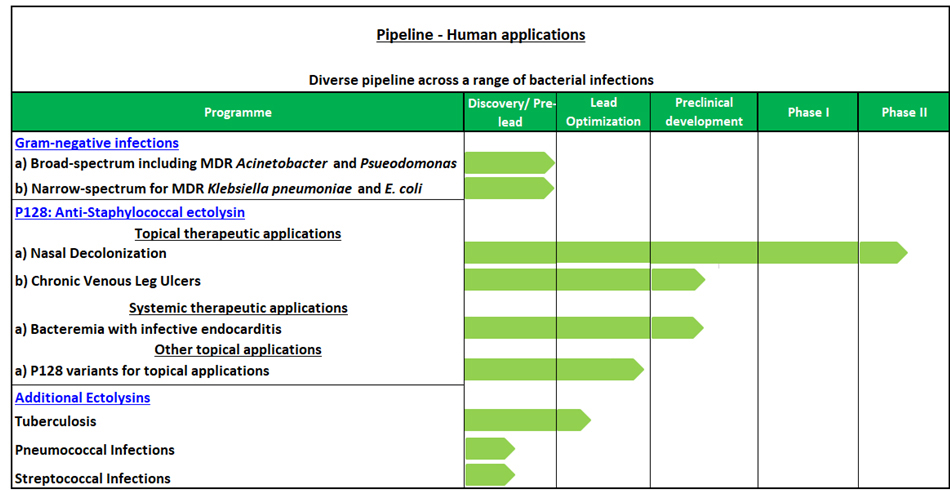GangaGen is developing a pipeline of ectolysins and other protein antibiotics to target areas of high unmet need.

Ectolysins are different from traditional antibiotics. They act very rapidly to lyse bacteria and therefore have low potential for developing resistance. Each ectolysin is specific to the type of bacteria for which it is developed and leaves other beneficial bacteria unaffected.
Bacteriocins are protein antibiotics produced by bacteria to inhibit or kill other bacteria in niche and overcrowded environments. Bacteriocins also are highly genus specific and exhibit narrow killing spectrum. GangaGen is developing chimeric bacteriocins as narrow spectrum agent for targeting Gram-negative bacteria.
GangaGen’s programme targeting Gram negative infections include ectolysins and protein antibiotics called bacteriocins targeting clinically relevant Gram-negative bacteria. Our Gram-negative ectolysin portfolio includes chimeric broad-spectrum antibacterial proteins active against the Gram-negatives in the ESKAPE category of pathogens. We have also developed narrow-spectrum bacteriocins with potent activity against multidrug-resistant (MDR) organisms.
GangaGen’s anti-staphylococcal programmes are built on GangaGen’s lead ectolysin, P128. P128 is specific to Staphylococci, including methicillin-resistant strains of Staphylococcus aureus (MRSA) as well as coagulase-negative Staphylococci.
GangaGen has discovered and designed potent ectolysins targeting Mycobacterium and other Gram-positive infections caused by Enterococcus spp. and Streptococcus spp.
Antibiotic-resistant infections are an increasing public health concern, both in hospitals and in the community, and new classes of antimicrobial agents with different mechanisms of action are urgently required. According to estimates, antibiotic-resistant bacteria cause 23,000 deaths each year in the United States and 25,000 in Europe.
GangaGen is addressing two very serious areas of antibiotic resistance: Staphylococcus aureus and Coagulase-negative staphylococci (CoNS).
S. aureus causes a range of illnesses including life-threatening diseases such as pneumonia, meningitis, osteomyelitis, endocarditis, toxic shock syndrome, bacteremia, and sepsis. S. aureus is one of the most common causes of hospital acquired infection and post-surgical wound infection.MRSA has been recognized as a priority pathogen by the World Health Organisation and the need for new treatments is being given significant priority.
Coagulase-negative Staphylococci have been identified as a major cause of foreign body-related infections, especially catheter-related blood stream infections . These infections are responsible for significant human morbidity, mortality and economic loss throughout the world. Because of involvement of biofilms, these infections are difficult to treat and are often chronic and recurrent in nature.
